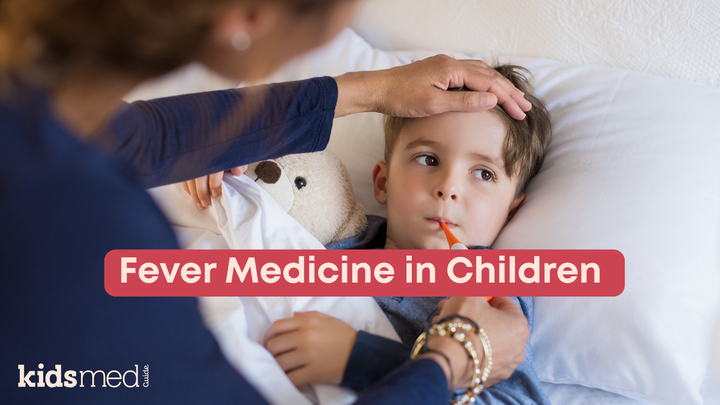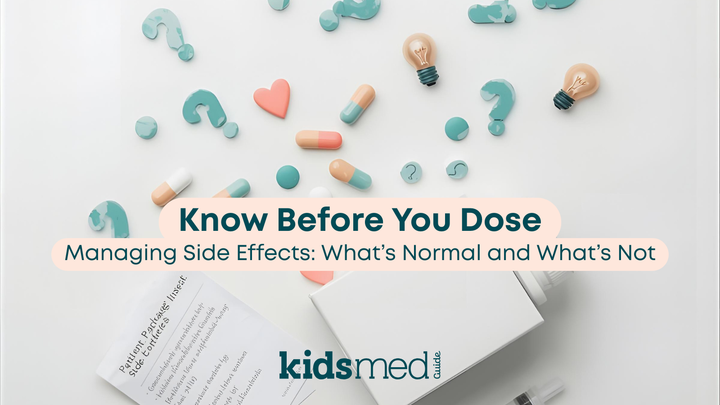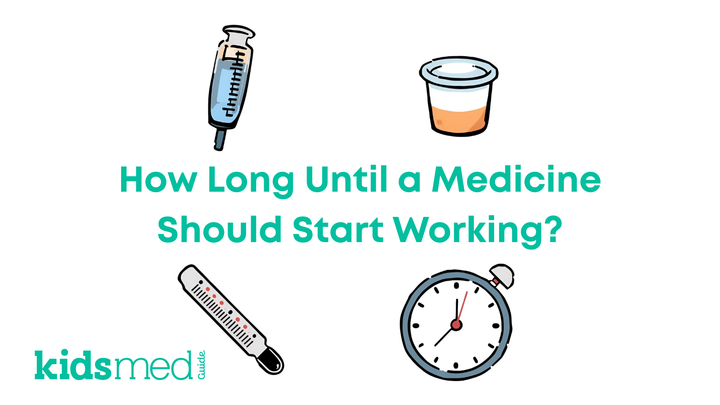OTC Cold Medicine Safety and Guidance for Children
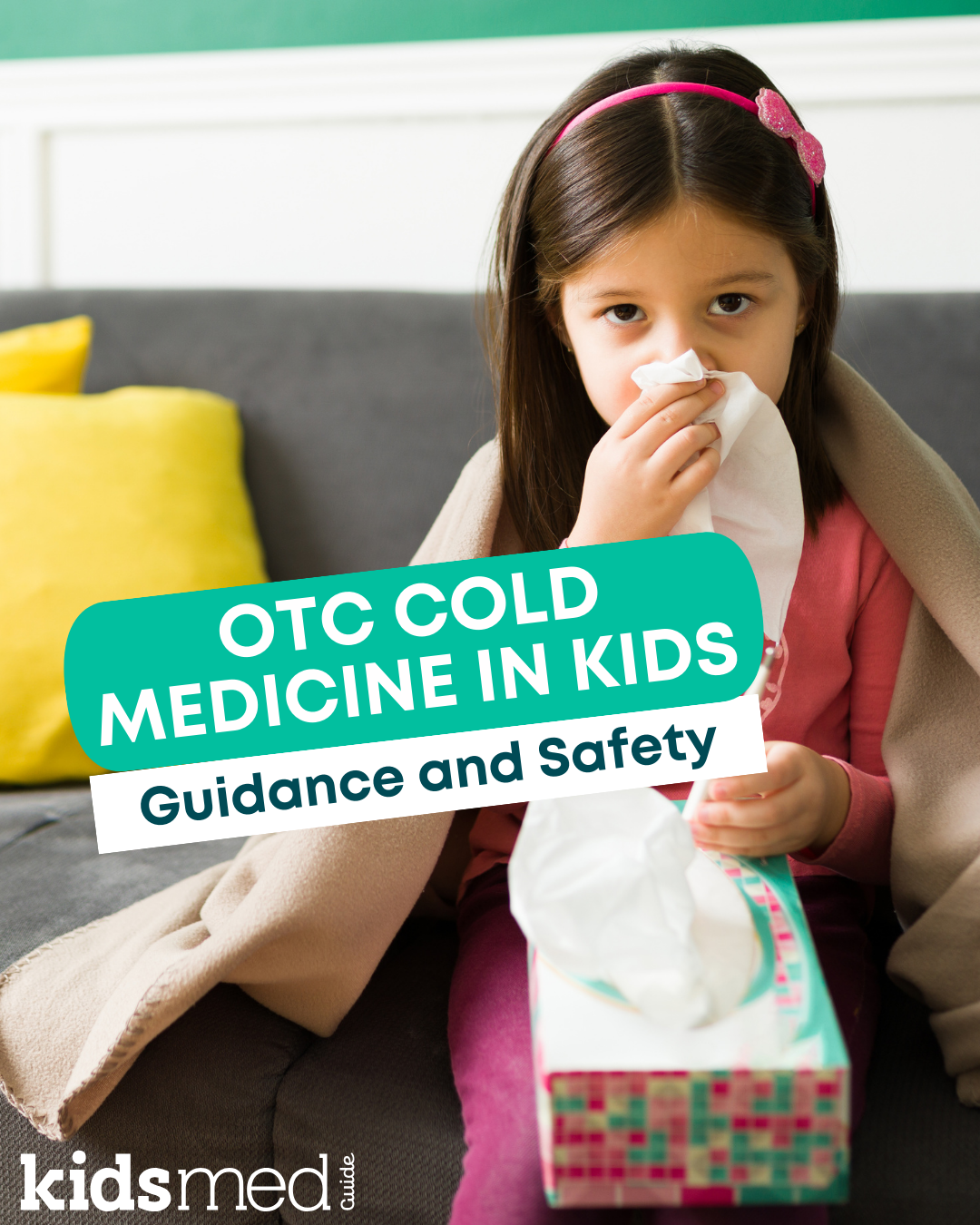
When your little one catches a cold, it’s tempting to rush to the pharmacy and grab any bottle in the kids’ section labeled “cold and flu” because colds in kids are the worst! So many boogers, and it can last for what seems like 100 days.
As tempting as that is, please pause. Cough and cold medicine is generally not recommended for children, especially those aged 6 and younger. Read on for details about the risks, when using medicine for colds is okay, and what home remedies to try instead.
Understanding OTC Cold Medicines for Children
What “OTC” means & common products available
“OTC” means you can buy it over-the-counter or directly from the pharmacy shelf without a prescription. Common options include decongestants, antihistamines, cough suppressants, expectorants, and combination products.
Difference Between Adult and Children’s Formulations
Children’s versions contain doses suitable for pediatric patients and include kid-friendly liquids or flavors, but unfortunately, that doesn’t make them all safe. Not all OTC children’s medications available on the shelf are actually recommended by pediatricians.
Adult medications can seriously overdose a child. When your child needs an OTC med, always choose child-specific formulations and check the label for age, weight, and dose recommendations.
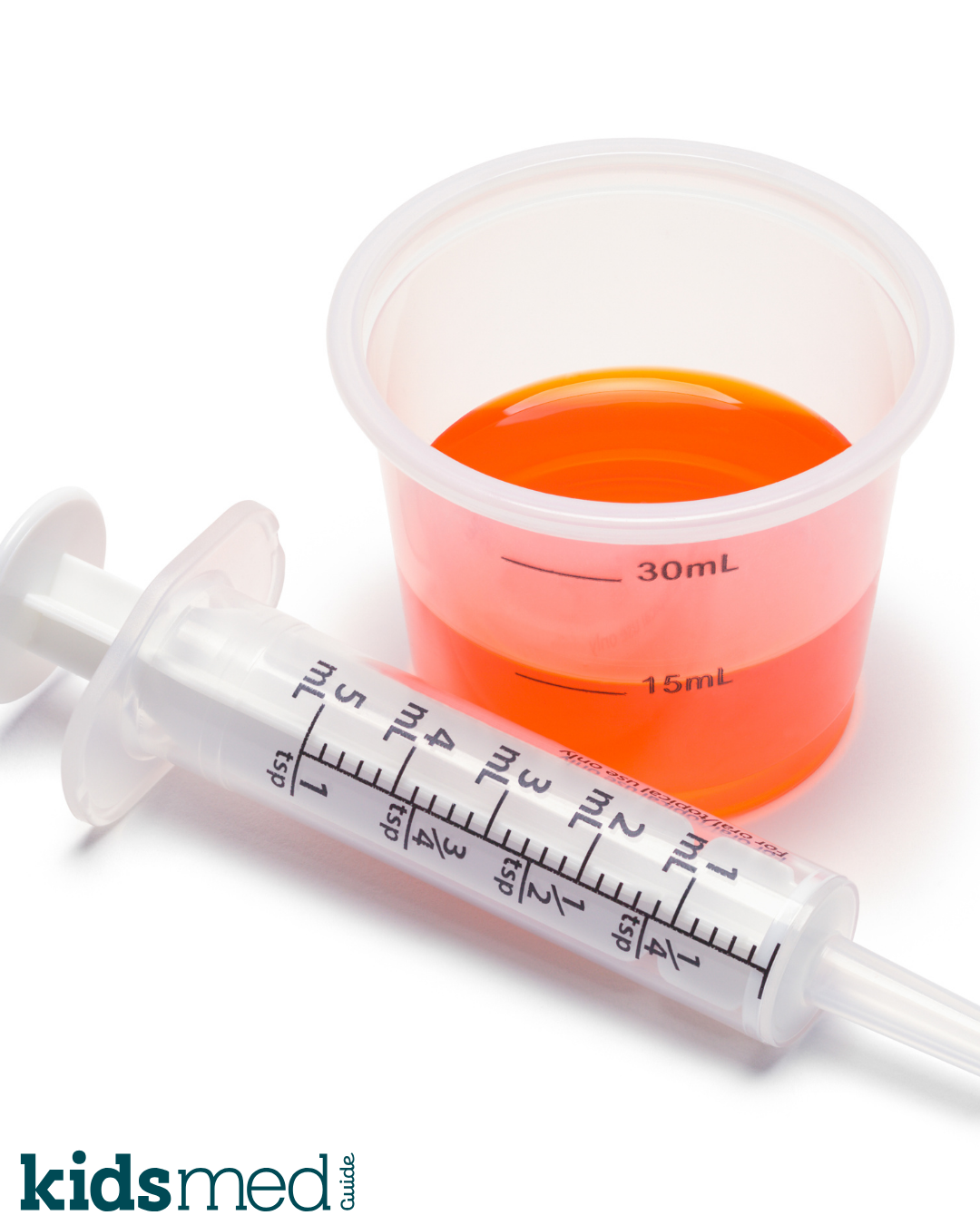
Why Cold Medicines Can Be Risky for Kids
Age restrictions
All cough and cold products are labeled NOT to be used in children under 4 years of age, due to the risk of significant side effects. Children under 2 years old are especially at risk for severe side effects, including (rarely) death.
The AAP and many physicians also advise against using cough and cold medicines in children aged 4-6 due to their side effects and limited benefits. These medicines simply don’t work well.
Our advice? Do not give cough or cold medicine to children six and younger, unless your trusted pediatrician specifically recommends it for a child aged 4-6.
You may consider using cold medicine for children over the age of six if the product is labeled for that age group; however, it’s essential to remember that OTC cough and cold medicines can have side effects and are often not very effective.
Consult your pediatrician if you have any questions. My personal recommendation is to avoid cough and cold medicines for all children, regardless of age. I don’t even use them myself!
Potential side effects & overdose risks
Giving cold /cold medicine to a child under four or making a dosing mistake in a child of any age could cause serious side effects, such as irregular heartbeat, severe drowsiness, and breathing problems.
Dangers of mixing multiple medications
Many cough and cold medicines are combos, meaning they have multiple ingredients. For example, most include acetaminophen, so giving a separate Tylenol (acetaminophen) can double the dose, risking liver damage.
Safe Alternatives and Home Remedies
While we advise against cough and cold medicines for children 6 and under (unless your pediatrician specifically recommends them for kids 4-6), and only in very limited cases for kids older than 6, don’t worry!
Research indicates that cold medicines are not very effective and are no better than a placebo. You’re not missing out on anything. Home remedies still stand as the best choice for treating a cold.
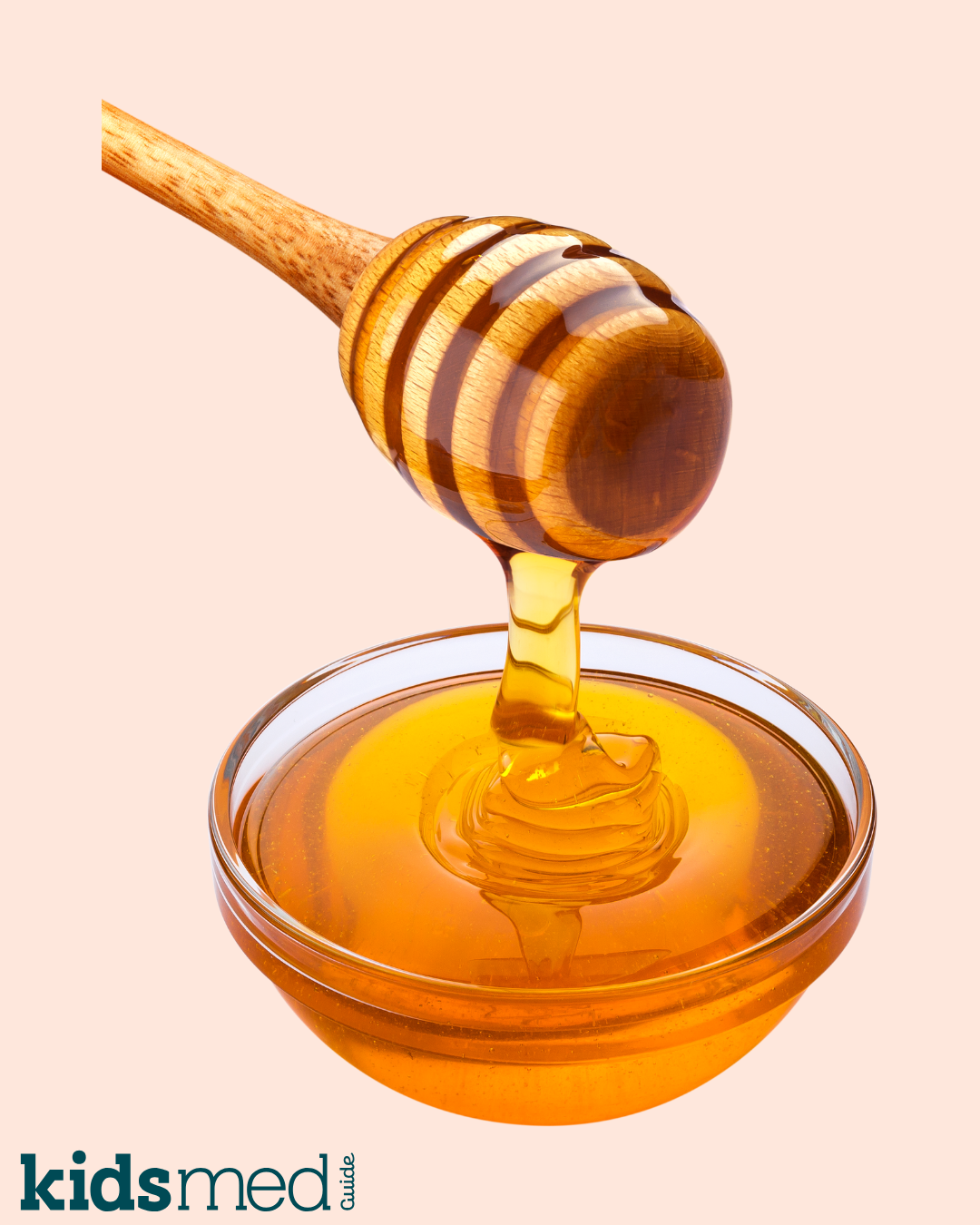
Hydration, rest, and comfort
Warm liquids, cozy blankets, and rest are still the MVPs when it comes to treating a cold. Rest and fluids, rest and fluids, rest and fluids!
Saline sprays, humidifiers, and honey (age‑appropriate)
Saline spray and bulb suctioning clear the nasal passages. Cool-mist humidifiers soothe inflamed airways and help to break up congestion. Honey, for kids age 1+, can calm coughs—but do not use honey in babies under age 1 due to the risk of botulism. Check out our Sick Day Essentials blog for our favorite home remedies!
Ibuprofen or acetaminophen for fever and comfort
If fever, aches, and pains are a concern, offer acetaminophen or ibuprofen (age 6 months and older) to reduce the fever and provide comfort. Combine this with plenty of rest and fluids.
Note: Any cold or fever in a baby 3 months of age or younger should be evaluated by a medical professional immediately.
When OTC medicines may be appropriate under doctor guidance
If rest and non-drug remedies don’t work, and your child is over age 6, an OTC cough or cold medicine may help. However, we recommend using an OTC cold product only under the guidance of your pediatrician and after carefully reading the label.
Dosage and Label Reading Tips for Parents
Importance of reading instructions carefully
Yes, even the small text. Dosing accuracy is everything, especially for kids. Pay attention to the concentration of the product and double-check the dose is correct for your child's age and/or weight.
Understanding “active ingredients” on labels
Check for repeats like acetaminophen, antihistamines, or decongestants. Be careful not to use another product with the same ingredients and accidentally double-dose.
Using dosing syringes/spoons accurately
Use the syringe or cup that comes with the medication, not kitchen spoons. Liquid medicines are measured in milliliters (mL), and a dosing syringe or cup will clearly note markings in mL.
When to Call the Pediatrician
Red‑flag symptoms parents shouldn’t ignore
High fever, fever in a baby, difficulty breathing, lethargy, or symptoms lasting more than 10–14 days should prompt a call to your doctor or emergency services.
If your child has asthma or another lung disease, consult your pediatrician if they experience a new or worsening cough.
How long should cold symptoms last
Most colds resolve within about a week or two, although the cough may persist for several weeks. Beyond that, call your pediatrician.
Frequently Asked Questions
At what age can kids safely take OTC cold medicines?
Under 4: avoid. Ages 4-6: only with a doctor’s guidance. Age 6+: may be used if accurately dosed, but not recommended due to low efficacy and significant side effects. This is especially true for decongestants and cough expectorants.
Can I give my child cough syrup and a fever reducer together?
For children older than age 6, if you elect to treat a cold with OTC medicine, you can only use multiple products (like cough medicine and Tylenol) if they DON'T share the same active ingredient (e.g., acetaminophen). MANY cough and cold syrups contain multiple ingredients. Always read the labels to check for duplicates and consult a pharmacist if you are unsure.
What’s safer — OTC cough medicine or natural remedies?
Non-drug options like fluids, rest, saline, cool mist humidifiers, and honey (for kids over 1) are safer and just as effective. We do not recommend any homeopathic remedies, such as herbs or natural supplements. They have not been shown to be effective, and there is no guarantee of their safety in children.
Why are some cold medicines labeled “not for children under 6”?
FDA and AAP guidance show higher risks and limited benefits under 6 years.
How do I know if my child needs antibiotics instead?
Colds are viral—antibiotics don’t help. If symptoms suggest bacterial infection (e.g., persistent fever, ear pain, worsening cough), consult a doctor.
Takeaway
Skip the cold meds for young kids and focus on hydration, rest, and fluids. If you use cold medicine in older kids, read the labels and consult with your pediatrician for advice.
The following references were used to compile this information:
Commissioner, O. of the. (2025). Should You Give Kids Medicine for Coughs and Colds? FDA. https://www.fda.gov/consumers/consumer-updates/should-you-give-kids-medicine-coughs-and-colds
Cough And Cold Medicines. (n.d.). Retrieved August 27, 2025, from https://www.nationwidechildrens.org/family-resources-education/health-wellness-and-safety-resources/helping-hands/cough-and-cold-medicine-over-the-counter-otc
DeGeorge, K. C., Ring, D. J., & Dalrymple, S. N. (2019). Treatment of the Common Cold. American Family Physician, 100(5), 281–289.
How to Care for Your Child’s Cold. (2023, September 14). HealthyChildren.Org. https://www.healthychildren.org/English/health-issues/conditions/flu/Pages/caring-for-Your-childs-cold-or-flu.aspx
Pseudoephedrine (oral route)—Side effects & dosage. (n.d.). Mayo Clinic. Retrieved August 27, 2025, from https://www.mayoclinic.org/drugs-supplements/pseudoephedrine-oral-route/description/drg-20067942
Research, C. for D. E. and. ( 2024 a). Key Information about Nonprescription, Over-the-Counter (OTC), Oral Phenylephrine. FDA. https://www.fda.gov/drugs/understanding-over-counter-medicines/key-information-about-nonprescription-over-counter-otc-oral-phenylephrine
Research, C. for D. E. and. ( 2024 b). Use Caution When Giving Cough and Cold Products to Kids. FDA. https://www.fda.gov/drugs/special-features/use-caution-when-giving-cough-and-cold-products-kids

